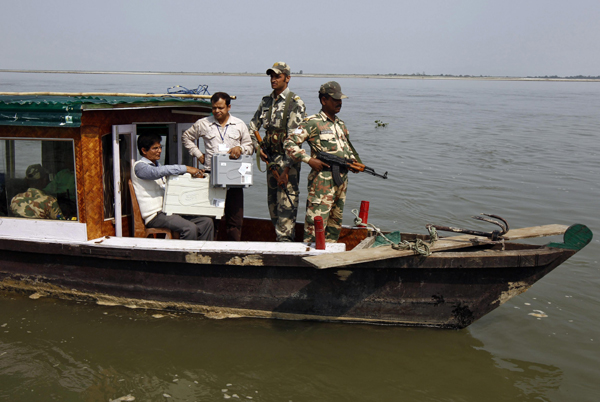Polling officers travel with electronic voting machines along with security personnel on a boat on the Dibru River, to reach polling stations in Laikadhudia, in Tinsukia district in the northeastern Indian state of Assam, on Sunday. Rupak De Chowdhuri / Reuters

Opposition leader Modi vows to revive $1t infrastructure program
The biggest general election the world has ever seen begins on Monday in a remote backwater of tea gardens and rice paddies, with India looking increasingly likely to embrace a coalition led by a Hindu nationalist to jumpstart a flagging economy.
India's 815 million voters are set to inflict a resounding defeat on the ruling Congress party, led by the Nehru-Gandhi dynasty, surveys show, after the longest economic slowdown since the 1980s put the brakes on development and job creation in a country where half of the population is under 25 years old.
Despite misgivings among many Indians about his handling of religious riots in 2002, Narendra Modi, the prime ministerial candidate of the main opposition Bharatiya Janata Party, has dominated a lengthy, frenetic campaign where parliamentary candidates range from a tech billionaire to a magician.
Voting will take place in nine stages over five weeks, kicking off in states close to Myanmar, then spreading to western deserts and the tropical south before ending on May 12 in India's densely populated northern plains. Results are due on May 16.
Assam, one of the lush but under-developed states where the election begins, is a rare bastion of support for Congress. But even here some villagers are impatient for change, saying they want highways to replace potholed country lanes so they can sell their crops and fish to markets across India.
"We have had some development but the pace is not fast enough. We need the next step ahead," said Manaspratim Buragohain in the village of Lezai, on the banks of a tributary of the huge Brahmaputra river and surrounded by paddy fields.
"Our businesses stay small because we need better roads and bridges," said Buragohain, a school teacher.
Modi, three-times chief minister of the western state of Gujarat, has run a high-octane campaign, with many rallies even in the south and northeast where the BJP is traditionally weak.
Across India, Modi - who will run for the holy Hindu city of Varanasi - has vowed to revive a $1 trillion infrastructure program, create jobs and help an ambitious, growing middle class whose economic success has sputtered in recent years.
"The Modi message has been very savvy," said Milan Vaishnav of the Carnegie Endowment for International Peace.
"He's pitching at the Indian middle class - people who are on $4-$10 a day, people who were until recently poor but now can afford consumer goods. Even the poorest people, those below that group, want some of that," said Vaishnav, an India expert.
While Modi has cut red tape and overseen a period of high growth in Gujarat, details of his policy plans, or "Modinomics", on the national scale remain sketchy. The BJP is due to release its delayed manifesto after voting starts on Monday.
The BJP and its allies are forecast to win the biggest chunk of the 543 parliamentary seats up for grabs but fall up to 38 seats short of a majority, according to an opinion poll released this week by CSDS, a respected Indian polling group.
Reuters
